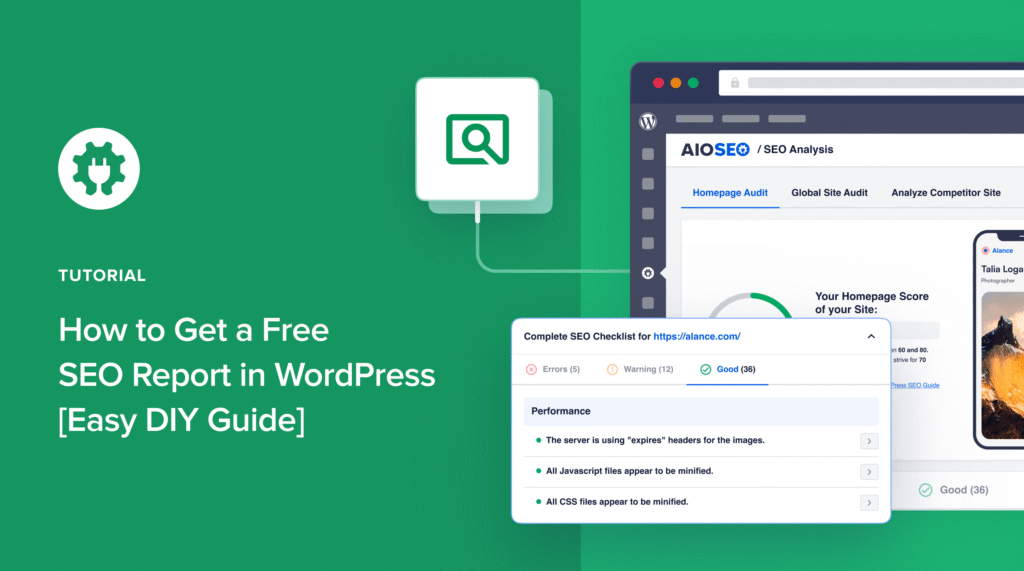When I first discovered I could run a free SEO report on my WordPress site, I honestly didn’t expect much. I thought my site was running fine—until the report flagged a handful of broken links, slow-loading pages, and even a couple of security issues I had completely overlooked.
Fixing those problems not only improved my rankings but also made my site faster and more enjoyable for visitors. That’s the power of SEO reports: they reveal hidden issues before they snowball into bigger problems, helping you keep both Google and your audience happy.
In this article, I’ll show you how to get a free SEO report in WordPress so you can improve your site’s performance and search rankings.
In This Article
What Is an SEO Report?
An SEO report is like a health check-up for your website. It scans your site’s pages and tells you what’s working well, what’s broken, and what’s holding back your rankings.
Instead of guessing why your site isn’t showing up in Google, you’ll see a clear list of issues with recommendations for fixing them.
A good SEO report usually covers things like:
- Missing or duplicate meta titles and descriptions
- Broken links that frustrate users and search engines
- Slow page speed or performance issues
- Incorrect use of headings (H1, H2, etc.)
- Problems with indexing and crawlability
- Missing schema markup for rich snippets
Think of it as a report card for your SEO. Even if your content is great, small technical issues can quietly hinder your site's performance.
Importance of Running SEO Reports on Your WordPress Site
Why should you bother with SEO reports in the first place?
For starters, they help you spot hidden problems early. Many SEO issues aren’t obvious until you scan your site, and regular reports give you the chance to fix them before they hurt your rankings.
SEO reports also improve user experience (UX) by highlighting broken links, slow load times, and security issues that frustrate visitors. A smoother site keeps people happy and encourages them to stay longer and explore more pages.
Additionally, SEO reports help you boost rankings by ensuring that your site and content follow SEO best practices.
The result?
Better visibility, more clicks, and increased organic traffic.
Personally, SEO reports save me time and offer clarity on issues impacting my site’s rankings. Instead of guessing what to do, I get an exact checklist of action steps. This makes it easy to focus on what truly matters and avoid wasting effort.
Furthermore, I primarily use free SEO reports. And I’ll show you how you can too.
4 Steps to a Free SEO Report in WordPress
Now that you know what an SEO report is and why it matters, let’s look at how to get one directly inside WordPress, without spending a dime.
Step 1: Install All In One SEO (AIOSEO)
One of the easiest ways to get automated SEO reports for your WordPress site is to use a powerful SEO plugin like All In One SEO (AIOSEO).

AIOSEO is the leading WordPress SEO plugin, trusted by over 3 million active users. Smart business owners, bloggers, and marketers rely on it to boost search rankings and drive qualified traffic straight to their WordPress sites. With features built specifically for WordPress SEO, AIOSEO makes it easy to optimize your posts and pages for maximum visibility in search results.
When it comes to free SEO reports, AIOSEO’s Site Audit feature scans your entire site and gives you a detailed audit of how well it’s optimized for search engines.
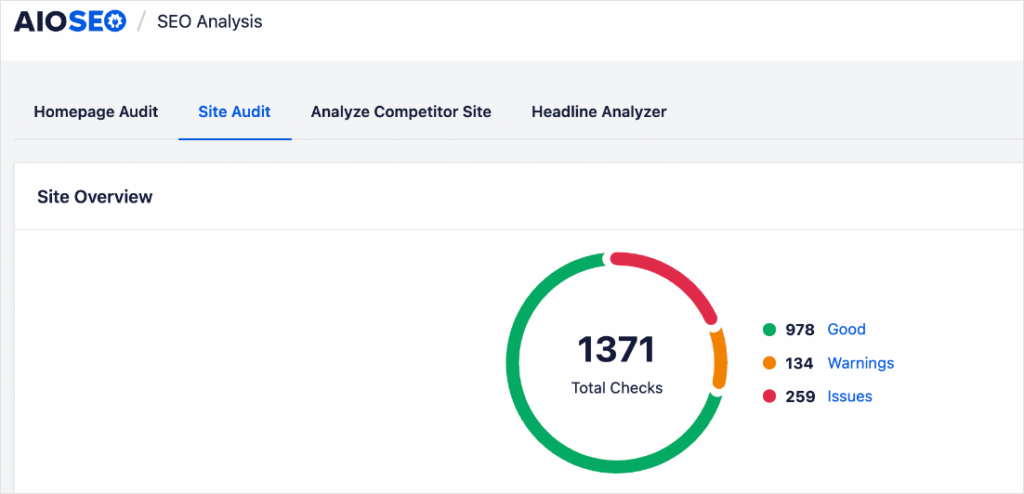
It gives you an overview of your optimization efforts and breaks them down into color-coded categories:
- Good (green)
- Warnings (orange)
- Issues (red)
This mini SEO report provides a quick overview of your site’s health.
Step 2: Run a Homepage Audit
Your homepage is one of the most important pages on your site. That’s why getting an SEO report on it is crucial. To do this, go to your AIOSEO menu » SEO Analysis » Homepage Audit.
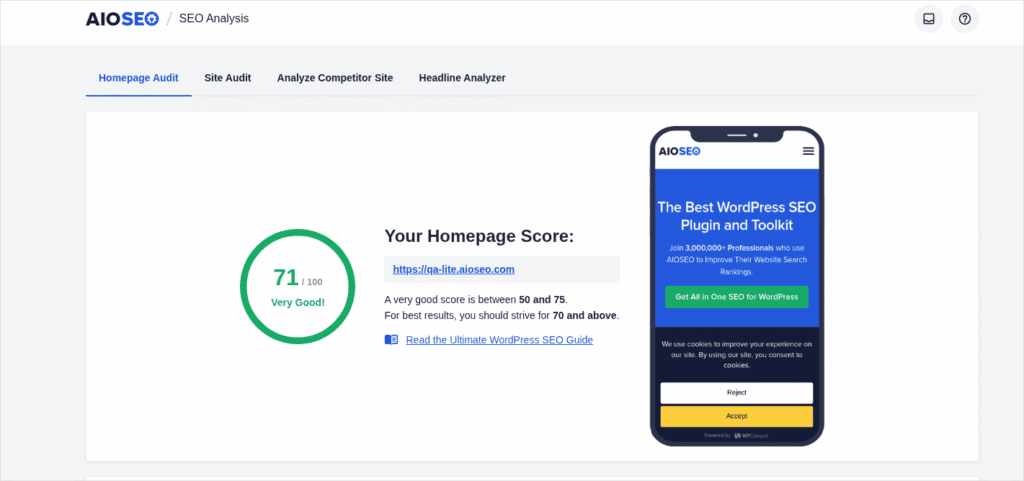
This feature conducts an in-depth scan of your homepage and highlights:
Basic SEO Issues
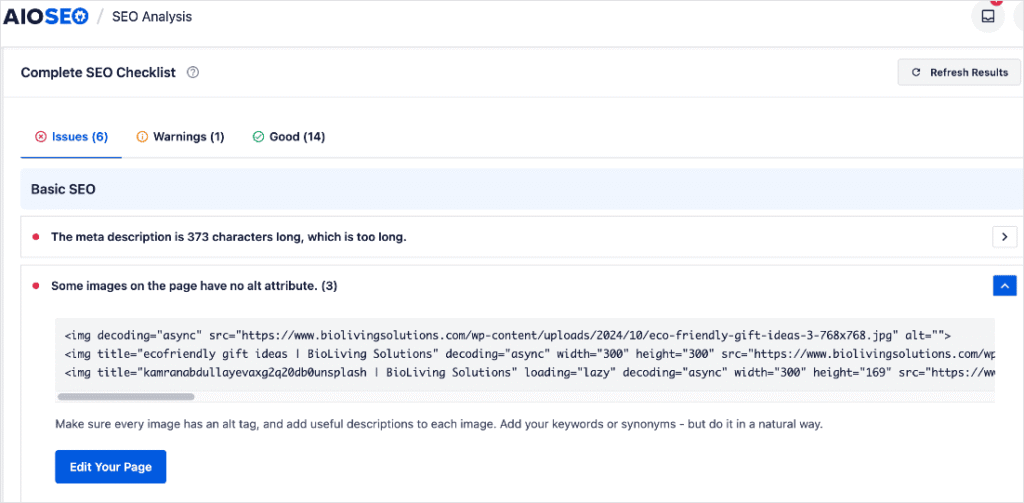
SEO works like building a house. If the foundation is weak, everything else you add on top eventually cracks. By optimizing basic elements like meta tags, headings, and content structure right from the start, you prevent small issues from compounding into:
- Major ranking drops
- Wasted content efforts
- Poor user experience later
In short, early fixes save you time, protect your SEO investment, and set your site up for long-term growth.
Performance and Security Issues
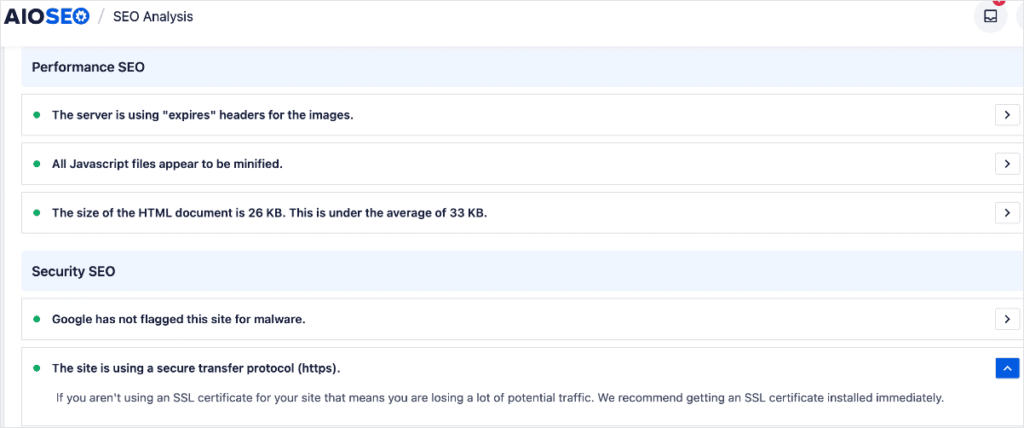
Performance and security are critical to SEO. A slow or unsafe site drives visitors away and signals search engines to rank you lower, while fast and secure websites earn higher visibility and trust.
Site Audit highlights common performance and security issues you may have overlooked, ensuring your site follows technical SEO best practices.
For more information on the impact of security, check out our guide to HTTPS and SEO.
Step 3: Run a Complete Site Audit
Another crucial element of an SEO report is understanding your site’s health. To do this, run a full site audit.
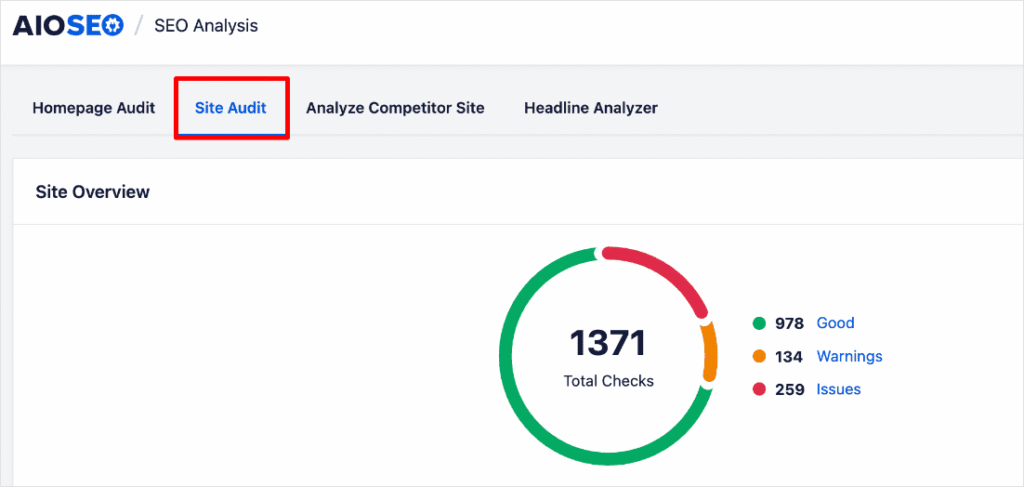
AIOSEO’s Site Audit tool makes this easy as it checks every post, page, and taxonomy for SEO problems.
One significant advantage of a site audit is that it identifies issues you might not notice on your own. For example, it can flag missing focus keywords or meta descriptions. These may seem small, but collectively they can significantly impact your rankings. Fixing them right away keeps your site healthy and signals to Google that your content is reliable.
Another huge benefit? Speed. Instead of wasting hours clicking through each page to hunt for problems, the Site Audit does all the heavy lifting in minutes. It also provides a clear, color-coded list of issues, sorted by priority. Critical issues are highlighted in red, allowing you to instantly identify what to address first for the greatest SEO impact.
Step 4: Identify and Fix Issues
An SEO report is meaningless if it doesn’t show you what to fix to improve your search rankings. This is one of the reasons I appreciate AIOSEO’s Site Audit feature more than other SEO audit tools. Not only does it reveal issues affecting my site’s SEO, but it also provides guidance on how to resolve them.
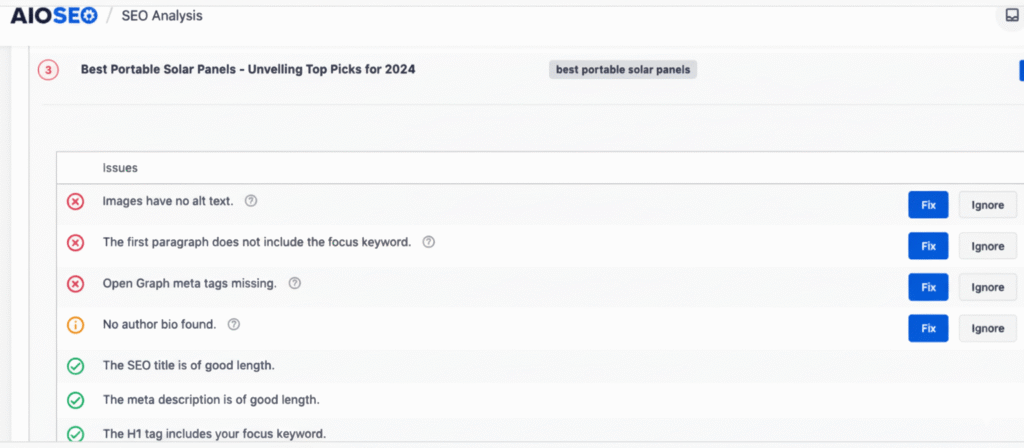
Some issues in the audit include:
- SEO title tag and meta description length
- Open Graph meta tags
- Keyword usage in important sections (H1 tag, introduction, URL, SEO title, and other areas)
- URL length
- And more
Next to each issue, you’ll see 2 buttons—Fix and Ignore. Clicking Fix takes you straight into editor mode, right to the spot that needs attention. This helps resolve the problem instantly and strengthens your site’s SEO. On the other hand, clicking Ignore removes the issue from the list.
I also like how the report includes tooltips that explain each issue.
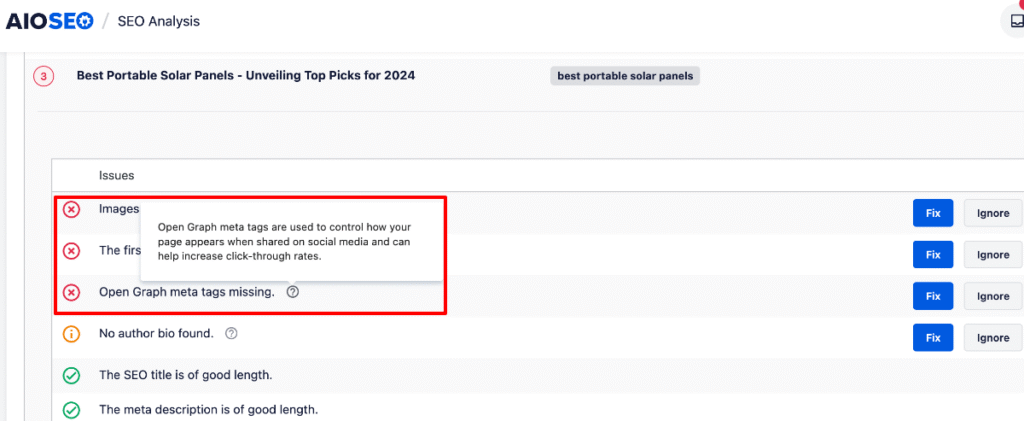
This makes resolving issues faster and helps you know exactly what you’re dealing with.
And that’s it!
You’ve got a free SEO report in WordPress.
Start Growing With Your Free SEO Report
Getting a free SEO report in WordPress isn’t just about spotting errors. It’s also about unlocking your site’s full potential. With tools like AIOSEO, you can quickly uncover hidden issues, fix them with confidence, and set your website up for higher rankings and better user experience.
Plus, you don’t need to be a tech expert. In just a few clicks, you’ll have a clear action plan to improve your site’s SEO and start driving more organic traffic.
So if you’ve been guessing what’s holding your site back, it’s time to stop guessing and start growing. Run your SEO report today and take the first step toward stronger search visibility and long-term success.
I hope this post helped you know how to get a free SEO report in WordPress. You may also want to check out other articles like our complete WordPress SEO tutorial or our list of the best SEO plugins.
If you found this article helpful, then subscribe to our YouTube Channel. You’ll find many more helpful tutorials there. You can also follow us on X (Twitter), LinkedIn, or Facebook to stay in the loop.
Getting a Free SEO Report in WordPress: Your FAQs Answered
What is an SEO report?
An SEO report is like a health check for your website. It shows what’s working, what’s broken, and what’s holding your site back from ranking higher in search engines.
Why should I run SEO reports on my WordPress site?
SEO reports help you catch hidden issues before they hurt your rankings. They also improve user experience by highlighting slow pages, security problems, and broken links, which keeps visitors engaged and boosts traffic.
How do I get a free SEO report in WordPress?
You can use plugins like AIOSEO to run a free SEO audit. It scans your entire site—including posts, pages, and taxonomies—and gives you actionable recommendations.
Disclosure: Our content is reader-supported. This means if you click on some of our links, then we may earn a commission. We only recommend products that we believe will add value to our readers.
